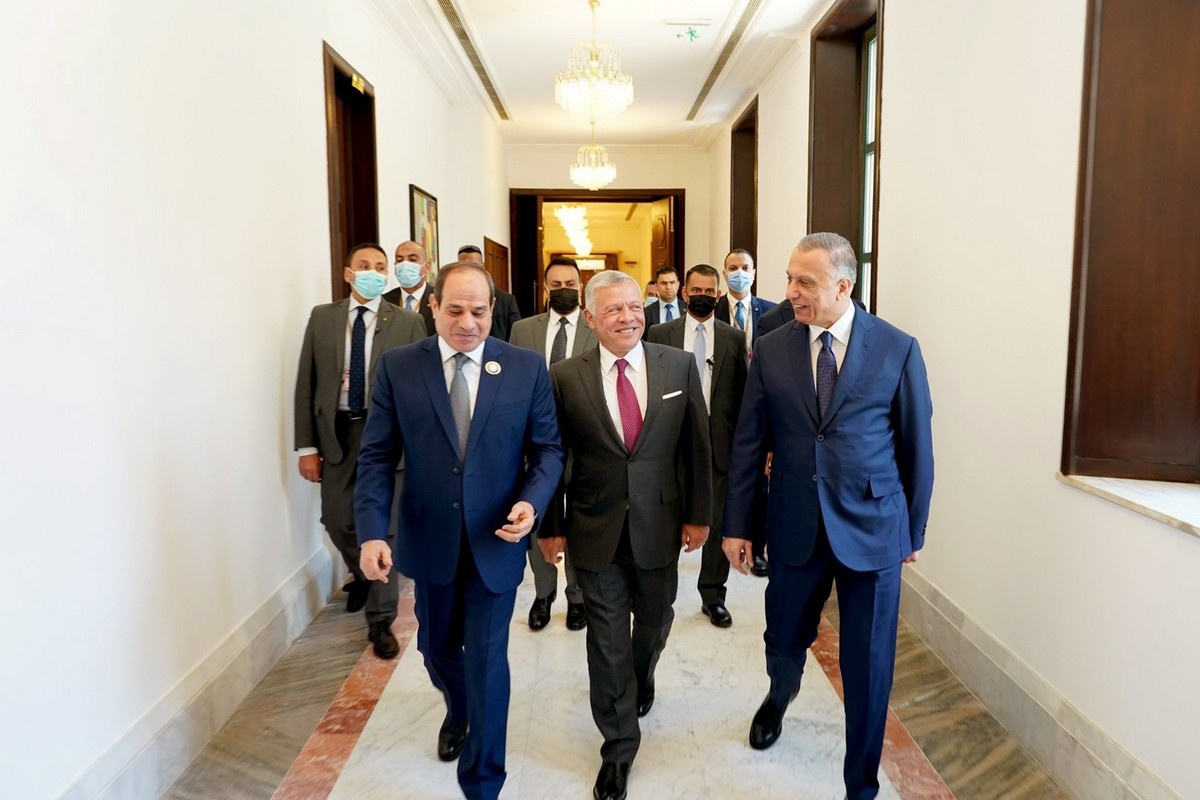

Iraq, Jordan and Egypt announced their agreement on security and political files — notably the fight against terrorism, the Palestinian cause and the Grand Ethiopian Renaissance Dam — at a tripartite summit in Baghdad last Sunday. The gathering brought together Jordan’s King Abdullah II, Egyptian President Abdel Fattah Al-Sisi and Iraqi Prime Minister Mustafa Al-Kadhimi.
The summit focused on economic, security and trade cooperation between the three countries and the rest of the region. They stressed the importance of coordination among themselves to confront challenges, terrorism and threats to Arab national security. They also agreed to stand with Egypt and Sudan regarding the dam on the River Nile.
The convening of the summit was prompted by risks and challenges that threaten the security of the region. The foreign ministers from Baghdad, Amman and Cairo confirmed that they have established mechanisms in the economic sector and emphasised that they will invest in economic and political opportunities. Although the summit’s priority was the economic situation, they stressed that Egypt and Jordan’s presence in Iraq was a deterrent for those behind the challenges faced. It is important, they said, that stability will not be possible without confronting terrorism and external interference.
During a joint press conference with his Iraqi and Egyptian counterparts, Fouad Hussein and Sameh Shoukry respectively, Jordanian Foreign Minister Ayman Al-Safadi asserted that they would be standing by Cairo and Khartoum regarding the Renaissance Dam, and the leaders’ consensus on regional issues, particularly support for the Palestinian cause and the two-state solution. He also stressed the importance of the Hashemite custodianship over the holy sites in order to preserve the Arab identity of Jerusalem. Al-Safadi added that the Kingdom will stand by Iraq in its challenges and reconstruction.
READ: Pro-Iran militia leader vows retaliation against US troops in Iraq
Iraq’s Hussein, meanwhile, noted that holding the tripartite summit in Baghdad reflected the cooperation between the three countries. He pointed out that everyone is looking for cooperation and investment opportunities in various fields. Shoukry said that there was consensus on the main objectives of the meeting to promote economic integration of the Arab people and enhance their security.
According to the Egyptian Centre for Strategic Studies, the current bilateral relations between Iraq and Egypt suggests the possibility of enhanced trade between them with opportunities for Egypt to export building materials for the Iraqi market. In the same context, the Egyptian Minister of International Cooperation, Rania Al-Mashat, stated that Egypt and Iraq seek to remove all obstacles to cooperation in order to achieve strategic integration in the economic, commercial and investment sectors.
A similar summit last August resulted in the New Levant project coming to light. This relies on integration between Egypt’s workforce, Iraqi oil and Jordan’s location. The project aims for Egypt and Jordan to obtain Iraqi oil at low prices, by extending a pipeline from Basra to the port of Aqaba in Jordan and then to Egypt. Egyptian electricity will also be exported to Iraq and Jordan. Joint industrial zones will be developed, along with cooperation in small and medium enterprises, supporting innovation and entrepreneurship, cooperation in healthcare, infrastructure and reconstruction, and increased trade between the three countries.
READ: Iraq borrows $360m from World Bank to expand gas facility
The region thus sees a new alliance taking shape for a “regional economic system to defend the three countries, which have been damaged for several reasons and suffer from political and security threats.” This tripartite economic alliance could reduce Iraq’s dependence on Iran for energy, although Washington always grants sanctions exemptions so that Baghdad can do so.
The importance of the summit lies in the unspoken fact that Iraq is an Arab country and that Al-Kadhimi’s government seeks to reduce its reliance on Iran. Now it is important to translate the projects into action on the ground, as well as overcome the inevitable bureaucracy and standardise customs fees. There is also a need to plan for customs exemptions for goods exported between the signatories of the New Levant project and open the door later for other Arab countries who wish to join the alliance, which is turning into a plan for economic integration and a joint Arab market.
This article first appeared in Arabic in Addustour on 28 June 2021
The views expressed in this article belong to the author and do not necessarily reflect the editorial policy of Middle East Monitor.
 RSS Feed
RSS Feed















 June 30th, 2021
June 30th, 2021  Awake Goy
Awake Goy  Posted in
Posted in  Tags:
Tags: 













